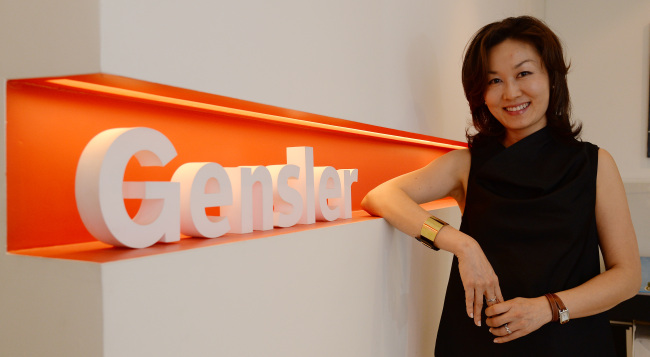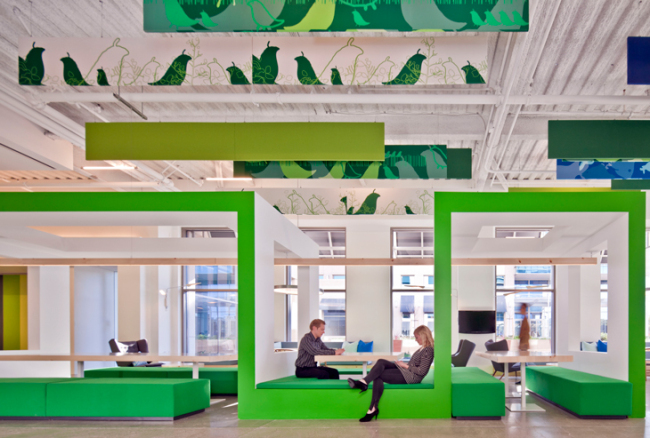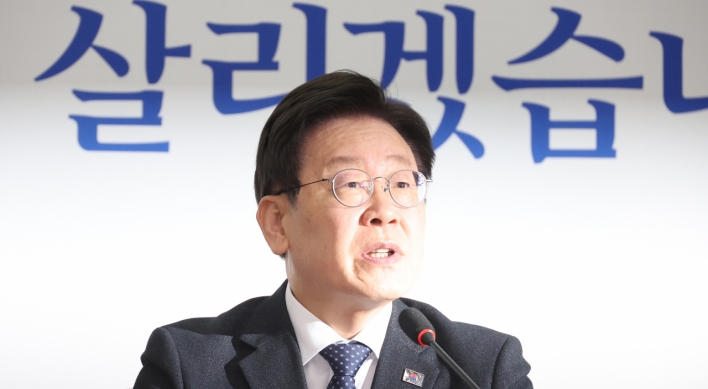People-focused design shapes offices of future
Workplace design affects performance: Gensler
By Seo Jee-yeonPublished : Nov. 21, 2014 - 21:23
Improving performance has been the top priority for organizations all over the world, and solutions vary accordingly.
“Workplace design has emerged as an important factor affecting the performance of an organization in the era of knowledge-based and technology-driven economy,’’ K. Chung, managing director of Gensler Korea, told The Korea Herald in a recent interview.
U.S.-based Gensler, the world’s largest design and architecture firm, has had a consistent interest in using the power of design to improve organizations’ productivity since its foundation in 1965 in San Francisco.
The company’s study found that in today’s changing industrial landscape, people with creative and innovative ideas, equal to technology, have become the most important asset of an organization.
This is why global tech giants like Apple, Google and Samsung adopted design to upgrade their workplace by reflecting new ways of working and thereby help their talents to be more creative and productive.
Apple, for instance, worked with Gensler not only for the design of its ring-shaped headquarters in Cupertino but also for the design of its retail shop Apple Store.
“When designed well, the workplace environment can be a powerful vehicle to maximize human capital,” Chung said.
“Workplace design has emerged as an important factor affecting the performance of an organization in the era of knowledge-based and technology-driven economy,’’ K. Chung, managing director of Gensler Korea, told The Korea Herald in a recent interview.
U.S.-based Gensler, the world’s largest design and architecture firm, has had a consistent interest in using the power of design to improve organizations’ productivity since its foundation in 1965 in San Francisco.
The company’s study found that in today’s changing industrial landscape, people with creative and innovative ideas, equal to technology, have become the most important asset of an organization.
This is why global tech giants like Apple, Google and Samsung adopted design to upgrade their workplace by reflecting new ways of working and thereby help their talents to be more creative and productive.
Apple, for instance, worked with Gensler not only for the design of its ring-shaped headquarters in Cupertino but also for the design of its retail shop Apple Store.
“When designed well, the workplace environment can be a powerful vehicle to maximize human capital,” Chung said.

“Korean conglomerates have sought effective solutions for performance improvements, but few of them seek out a solution through a high-quality workplace.’’
The situation is reflected in Gensler’s business portfolio in Korea. Its works are found more in the retail and airport building sectors than at workplaces.
In one of its latest projects here, Gensler is renovating Coex Mall in the affluent Samseong-dong, southern Seoul.
Inside-out approach to design
Among a variety of achievements, Gensler has contributed to turning a place’s interior design into a key segment of the design industry.
“From the start, we have an inside-out approach to design,” Chung said.
Differentiated from others, the firm’s founder Art Gensler believed in the power of design to enhance the lives of users and worked closely with his clients to meet their demand for the project’s success.
As a case in point, Gensler worked closely with its new start-up client Airbnb to complete the new head office in San Francisco. Airbnb is an online community marketplace allowing guests to book accommodation directly from hosts.
The interior and exterior design of Airbnb’s new office perfectly expresses the young company’s ethos of openness, collaboration and constant enterprise ― all in the comfort of home.
According to Gensler, Airbnb’s mantra, “travel like a human,” was translated into a meandering path that connects the spaces ― from library to the full-service kitchen and large dining area ― and the spectacular city views.
“It seems to be taking more time to apply our inside-out approach to design in Korea, because in most design and architecture projects here, focus is still put on the exterior design only,” she said.
“The exterior appearance of a place or a building is important as well, but it is equally important to create a place that reflects the people’s unique culture and values so it can make the organization more productive.”

Gensler delivers design to meet clients’ needs. At the same time, the design firm also seeks such values as sustainability and contribution to the community when carrying out projects in an array of sectors ranging from workplace to retail to hospitality.
“Gensler has delivered a unique and quality design to its clients to get a wow effect. We want to take our clients to a level that they have not imagined,” Chung said.
Chung, who joined Gensler in 2004, found another competitive edge for the firm in its organizational culture as well.
“As one firm, Gensler’s 4,000-plus professionals networked across 46 locations worldwide share the same values for design and work together for the optimal delivery of a project under a flat and collaborative working environment,” Chung said.
As a design expert with 20 years of experience, Chung’s future goal is not different from his colleagues.
“I just want to make ‘good’ design, which is innovative and unique, and enables peoples’ lives to improve,” she said.
Trends shaping design
This year, Gensler is publishing the 2014 design forecast highlighting the trends that will shape design in the coming decade.
“The company has invested in studying changes in people’s lifestyles and in workplaces, as these changes will affect the future of design,” she said.
The publication selected six big topics that will shape design trends ― workplace, wellness, technology, urbanization, globalization and development ― and then, took a closer look at changes in each topic.
Regarding workplace trends, Gensler forecast organizations will get serious about the problems of mobility and collaboration.
“Today, people at work need to focus, but they also need to interact,” Chung said.
Mitigating conflicts between interactive and focused work will be a top priority in the design of the office setting, the report predicted. Reflecting the trend, workplace design will offer activity-based space and furniture to calm distractions.
In line with a growing number of start-ups, the report also predicted the market for coworking spaces in which individuals share an office environment will take shape.
“Coworking sites are proliferating across the U.S., growing as a mecca for innovation,” she said.
The report picked the worldwide wellness movement as a key trend for future design. ‘‘Wellness is a social issue, so design will be called on to make it part of the everyday,” the report said.
Under the topic of technology in the analysis of trends, Gensler underlined the integration of technology with space.
The report says that as places get smarter, people will shape how they experience places to reflect their preferences. Realizing tech’s full potential will be a design priority in every market sector, it added.
“All in all, keeping up with trends, Gensler will continue to leverage the power of design to create a better world,” Chung said.
By Seo Jee-yeon (jyseo@heraldcorp.com)



![[Herald Interview] 'Amid aging population, Korea to invite more young professionals from overseas'](http://res.heraldm.com/phpwas/restmb_idxmake.php?idx=644&simg=/content/image/2024/04/24/20240424050844_0.jpg&u=20240424200058)







![[Hello India] Hyundai Motor vows to boost 'clean mobility' in India](http://res.heraldm.com/phpwas/restmb_idxmake.php?idx=644&simg=/content/image/2024/04/25/20240425050672_0.jpg&u=)





![[Today’s K-pop] NewJeans' single teasers release amid intrigue](http://res.heraldm.com/phpwas/restmb_idxmake.php?idx=642&simg=/content/image/2024/04/26/20240426050575_0.jpg&u=)